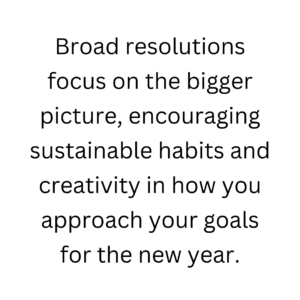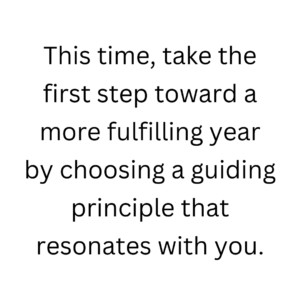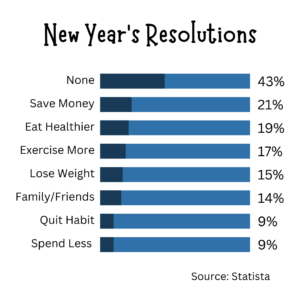
Think Big: Why Broad New Year’s Resolutions Are the Key to Lasting Change
 I've committed myself to some fantastic New Year's Resolutions that never made it out of January. I bet I am not alone. Every year millions of us make resolutions in an effort to make the new year better than the last. These resolutions are often very specific - lose 10 pounds, go to the gym four days a week, save $2,000. As January nears an end, much like many of my past resolutions, not only are we not going to the gym four days a week, we also feel guilty about it.
I've committed myself to some fantastic New Year's Resolutions that never made it out of January. I bet I am not alone. Every year millions of us make resolutions in an effort to make the new year better than the last. These resolutions are often very specific - lose 10 pounds, go to the gym four days a week, save $2,000. As January nears an end, much like many of my past resolutions, not only are we not going to the gym four days a week, we also feel guilty about it.
Members, Download Your Free Copy of Positive Self-Care Starter
Why does this happen year after year? One reason is that these overly specific resolutions are also very rigid and unforgiving. A single misstep - too tired to go to the gym today - can derail progress and lead to an all-or-nothing mindset. But a few years ago I decided to try something a little different. Rather than make a specific goal for the year, I decided to go broad. My resolution that year wasn't to lose weight or save money but rather to focus on well-being. My goals were not specific at all but rather to keep a well-being mindset for the year and give a little extra thought to my behaviors and how they build or detract from my well-being.
The Power of Broad Themes
Broad resolutions shift the focus on your goals from rigid behaviors to guiding principles or values. Instead of "Go to the Gym Four Days a Week," try "Be Active." This theme allows for more adaptability to life's real-world challenges. You can go to the gym if you decide to but you don't have to. Since the goal is to be active, you could also keep this resolution by "Going for a Walk" or "Doing Yoga." Heck, with broad goals like this you can keep your resolution by merely "Dancing in the Kitchen" while you make lunch for your family or even get your kids involved so the whole family stays active.
Broad resolutions focus on the bigger picture, encouraging sustainable habits and creativity in how you approach your goals for the new year. They aren’t about hitting a specific target but about creating a mindset that supports ongoing progress. And the good news is that as we engage in regular activity, it starts to become part of our regular routine. No gym needed.
Broad vs Specific Resolutions
To understand how broad themes work better than specific resolutions, we can compare a few of the most popular resolutions that adults make every year. According to Statista (Flick, 2024), 21% of U.S. adults make resolutions focused on saving money. Another 19% want to eat healthier, 17% want to exercise more, and 15% want to lose weight. Further down the list includes 14% who want to spend more time with family and friends, 9% who want to quit a bad habit like smoking, and another 9% desire to spend less money. Interestingly, according to their research, 43% of us don't make any New Year's resolutions.
New Year's resolutions are more popular with younger folks (Gracia, 2024) than with those of us who have a few more years of life experiences. Perhaps it is this experience of failure that causes us to stop making resolutions altogether. Not surprising though, for those who resolve to do something different in the new year, the resolutions around health and exercise are number one for all age groups.And for obvious reasons, younger people tend to focus on money and career while older people tend to focus on more personal resolutions that have been lumped into the final category - "something else."
According to Haworth (2024), not only will those who do not make a resolution fail to achieve it, more than 80% of those who do make resolutions, will also fail. If you do the math, that means barley 10% of us succeed in this annual endeavor. The Pew Research Institute looked at time and discovered that by mid January of last year, 41% of resoluters had already failed on some or all of their New Year's goals (Gracia, 2024).
So only 10% of us are succeeding in our resolutions each year and as we age, we stop trying. If we broaden our approach to resolutions, the activities that fulfil it increase and the rigidity of the resolution decreases. With more options, comes more freedom to adjust as needed without failing and eventually giving up. To understand why broad resolutions work better, let’s compare specific goals and broad themes side by side:
Specific Goal: “Save $2,000 by December.”
Broad Theme: “Practice Financial Wellness.”
The specific goal leaves little room for unexpected expenses or life changes and because it sets a specific amount, it is easy to see how one could fail. A major car repair in July could derail you and once the trend breaks, it is difficult to get back on it. The broad theme, however, allows for flexibility. You could focus on reducing unnecessary spending, creating a budget, or learning about investing even when unexpected financial burdens emerge.
The emphasis is on the process, not just the amount of money saved at the end. This method may not focus on saving the original $2,000 in savings - you may save even more - but it will hopefully create habits that help your new behaviors last not just throughout the new year, but perhaps even beyond that. In this sense, broad new year's resolutions are more than merely goals for the year, but rather long-term habits that you can integrate into your regular routine.
10 Examples of How to Go Broad
As you think about your resolution for the new year, consider using a keyword or brief mantra. Here are some examples:
Focus
Rather than set specific goals, prioritize clarity and attention in your work, relationships, and personal life. A specific goal, like "Get a Promotion at Work," becomes "Focus on bringing your best to your work."
Self-Care
Rather than set specific goals like "Read a new fiction book every month" or "Meditate daily," commit to self-care by nurturing your physical, emotional, and mental health. This will build habits that support rest, nutrition, and joy. Your resolution could be something like, "Prioritize Me Sometimes."
Growth
Rather than setting specific goals related to personal or professional behaviors and activities, embrace learning and development. Your broad resolution then becomes, "Take on challenges, explore new skills, and step out of your comfort zone in order to grow."
Connection
Fostering meaningful relationships is always a good goal. Spending quality time with loved ones, deepening connections, and practicing empathy have been shown to improve our well-being. Rather than a specific goal like "Call my friends weekly," consider a broader goal, such as "Give energy to my VIPs" including those who uplift you and make you feel good about yourself.
Creativity
Those of us who are artistic and find joy in creating may want to set a specific number of paintings or pieces of jewelry. Like saving a specific amount of money or engaging with friends a minimum number of times, setting specific goals can quickly be derailed. Instead, your resolution might be something like, "Explore your imagination through art, writing, or any creative outlet that inspires expression and originality."
Health
Rather than counting calories at every meal or tracking the number of reps at the gym, you may want to consider focusing on being healthier. In this sense, you can still do those reps, but you can be flexible too. Your resolution might be, "Make Healthy Decisions." Keeping an eye on your health may have a greater impact in the long run.
Resilience
Instead of focusing on avoiding difficulties or setting a specific outcome like "Learn stress management techniques," choose to build resilience. Your broad resolution might be, "Adapt and bounce back from challenges by finding strengths and resources in every situation." This promotes mental toughness and self-compassion during setbacks.
Gratitude
Rather than setting a rigid goal like "Write in a gratitude journal every night," choose to embrace a mindset of appreciation. Your broad resolution could be, "Cultivate gratitude by recognizing and celebrating the positive aspects of life, both big and small." Gratitude fosters positivity and long-term happiness.
Kindness
Sometimes the best thing we can do for our own well-being is to be kind to others. Rather than saying, "Do one random act of kindness per week," focus on a broader theme like, "Lead with kindness and compassion in your interactions with others." This encourages empathy and strengthens connections.
Mindfulness
Instead of setting a specific goal like "Meditate for 10 minutes daily," make your resolution, "Practice mindfulness by staying present in the moment and appreciating life as it happens." This theme reduces stress and fosters clarity and peace.
Bonus:
Any Strength
A powerful resolution can be to focus on developing your unique character strengths. Begin by identifying what you naturally excel at or what brings you the most joy.
You can use tools like the VIA Character Strengths Survey (Peterson & Seligman, 2004) to uncover your core strengths, such as creativity, perseverance, or social intelligence [The link is in the references section]. Or take AllPsych's Brief Character Strengths Inventory and do some research on your top few strengths (often referred to as your signature strengths). Then, build your resolution around these strengths. Your resolution could be to "Leverage and develop my strengths to create meaningful growth in my personal and professional life." This approach personalizes your resolution and aligns it with what makes you uniquely you.
Learn more about character strengths and how to live by your virtues (at least for the next year), in my previous blog Character Strengths and the Virtuous Life.
Why Broad Resolutions Promote Lasting Change: Questions to Ask Yourself
Broad resolutions work because they align with the way humans naturally grow and adapt. They focus on a mindset rather than specific activities. They also bring your attention away from absolute goals and achievement to a
 Here are four areas with questions to help ensure that your broad goals are more successful:
Here are four areas with questions to help ensure that your broad goals are more successful:
-
Flexibility: Broad resolutions are not bound by strict rules. This makes it easier to adjust your approach as life evolves. Is your resolution flexible enough to fit into your daily routine?
-
Intrinsic Motivation: Instead of chasing an external benchmark, you focus on intrinsic rewards like feeling healthier or more connected. Is your resolution motivated by your values and interests rather than the achievement of external praise or promotion?
-
Reduced Pressure: There’s no “failure” when you’re pursuing a theme. Setbacks are just part of the process, not the end of the road. Does your resolution feel comfortable and bring you joy rather than increasing your stress level and bringing you guilt when you fail?
-
Sustainability: Broad resolutions encourage habits and mindsets that last beyond January. They’re about lifestyle changes, not quick fixes. Is your resolution sustainable throughout the year? Does it create energy and motivation rather than draining you?
Conclusion: Think Big, Live Better
Broad New Year’s resolutions offer an alternative to the overly rigid, specific goals that often lead to failure and eventual frustration. By focusing on themes like 'growth,' 'connection,' or 'self-care' you create a framework for meaningful change that is flexible sustainable, and intrinsically driven. This time, take the first step toward a more fulfilling year by choosing a theme or guiding principle that resonates with you. Write it down, reflect on how it aligns with your values, and break it into small, actionable steps that use your strengths. Remember, it’s not about perfection but rather consistency. Your broad resolution serves as your compass to help you navigate the ups and downs of the year while staying true to what matters most.
I've been doing broad resolutions every year and I often catch myself throughout the year repeating the theme like a mantra, especially when I have to make important decisions or find myself unsure or just overcommitted. My theme of Well-Being kept me focused on what helped me flourish and gave me permission to say 'no' to some things that likely would not have. My theme for 2025 is still in the works but I'm thinking something related to optimism. Keeping a positive mindset and looking for successes resonates with me when I consider the opportunities and challenges I will likely face in the upcoming year.
How about you? How will you think big for 2025?
References
AllPsych (n.d.). Brief Character Strengths Inventory. Retrieved from https://allpsych.com/character-strengths-and-the-virtuous-life/
Haworth, J. (2024). Struggling to keep your New Year's resolutions? Here's howe to keep yourself on track. ABC News. Retrieved from https://abcnews.go.com/US/struggling-new-years-resolutions-track/story?id=96173041
Flick, A. (2024). America's top New Year's resolutions for 2025. Statista. Retrieved from https://www.statista.com/chart/29019/most-common-new-years-resolutions-us/
Garcia, S. (2024). New Year's resolutions: Who makes them and why. Pew Research Center. Retrieved from https://www.pewresearch.org/short-reads/2024/01/29/new-years-resolutions-who-makes-them-and-why/
Heffner, C. L. (2021). Character Strengths and the virtuous life. Retrieved from https://allpsych.com/character-strengths-and-the-virtuous-life/
Peterson, C. & Seligman, M. (2004). Character strengths and virtues: A handbook and classification. Oxford University Press; American Psychological Association.
VIA Institute. The VIA Character Strengths Survey. Retrieved from: https://www.viacharacter.org/account/register

